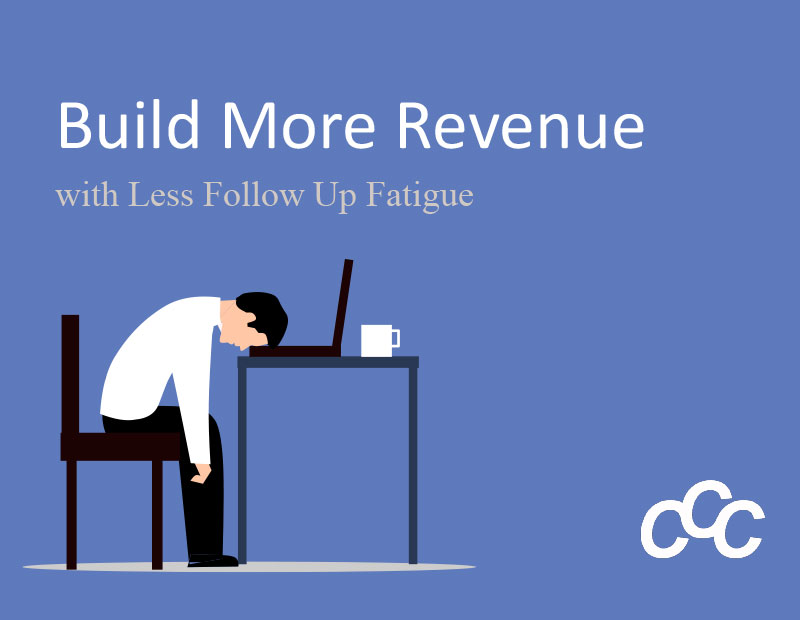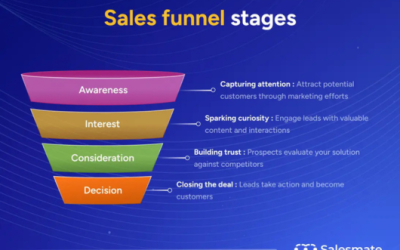When something is not built or implemented correctly, it causes unnecessary stress for the end-user. It could be a vehicle with faulty mechanics, a website with outdated code, or a house that was built using shortcuts. A CRM is no different. When the implementation is done poorly, the salespeople and the business suffer. For the salespeople, the stress causes Follow Up Fatigue.
Follow Up Fatigue happens when your life is consumed with unneeded follow-up which causes other areas of your life to deteriorate from business relationships to family life. If you want to learn more about Follow Up Fatigue, you can read our series of articles. Although Follow Up Fatigue is common in the workplace including locally-owned small businesses, it does not have to be the norm. In fact, any business that uses a CRM can start eliminating Follow Up Fatigue with a proper CRM implementation. If you already have a CRM, it is not too late. The following recommendations can still be implemented in an existing CRM.
Here are 3 ways that can help you eliminate Follow Up Fatigue when you are implementing a CRM. Use these ideas to create “Wins” for your team and the CRM so that the team sees the CRM’s value.
Set clear business goals and use the CRM to measure your results
Every business has a goal to improve sales and increase revenue, but if you do not clearly state how you want to reach those goals, it is difficult to reach them. Why? Because the goal to improve sales and increase revenue is too general. Clear business goals include defining key performance indicators (KPIs) that need to be measured. For example, you would like to increase sales by 25% from website leads. This is a clear goal because you have defined your percentage and its source. You can set up your goal in your CRM and track your website leads. If you do not have website leads set up as a goal, you are increasing the risk of Follow Up Fatigue, because you do not know the source. Therefore, you are treating every lead the same. Qualified or not. Business goals give you direction. Your CRM helps you stay on track and reach your goals.
Management must lead the way in proper CRM use
When leaders lead by example, businesses grow, and employees follow. Businesses that excel in the adoption of software and technology start with business owners and upper management. Invite key team members to become involved in the planning stage. Layout a plan of implementation that shows how your business will use the CRM collaboratively from owner to project manager. When a plan of expectations, responsibilities, and accountability is included in the CRM implementation, your team will know what is expected of them. This will minimize internal Follow Up Fatigue, but it is only successful when management leads the way. If you would like to learn more on this subject, you can read our article, “CRM Implementation: 3 Practices That Will Make It Successful.”
Automate tasks both internal and external
Automation is a beautiful time saver when it is set up correctly. It can be used for internal tasks and processes as well as prospect and customer nurturing. Follow Up Fatigue takes root when we feel like we must respond to every inquiry and be in control of every follow-up. It can also take root when your team is unsure of what is happening and eats up time trying to get answers. Automation can be used in many ways. Here are few ways that you can use CRM automation to eliminate Follow Up Fatigue and reduce your stress:
- Many internal processes can be automated with tasks and notifications, so you always know where a customer order or project stands
- Customer appreciation can be automated through your CRM such as birthdays and referral discounts
- Email drip campaigns can be automated to nurture prospects and customers with tailored content to meet their needs and make them feel valued
- Segmentation of contacts can be automated with pre-determined criteria
- Detailed and specific reporting can be automated and sent to people such as executives, sales managers, or warehouse managers
Conclusion
The common denominator is CRM. How it is implemented determines if you are creating unnecessary Follow Up Fatigue or eliminating it. If you are experiencing Follow Up Fatigue and would like to know how to eliminate it with your CRM or are not currently using a CRM, contact us at 301-332-0613 or fill out the form. We would love to help you develop a strategy to eliminated Follow Up Fatigue.





